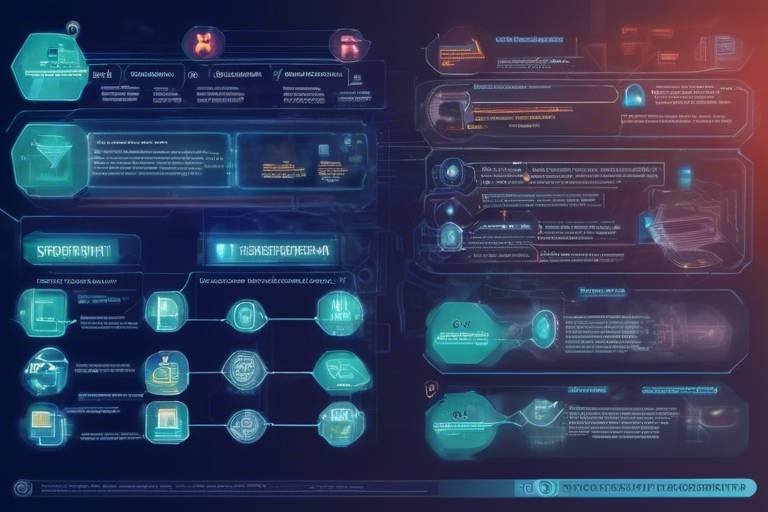Are Free Antivirus Software Just as Good as Paid Ones?
In today's digital age, the question of whether free antivirus software can hold its ground against paid options is more relevant than ever. With the increasing number of cyber threats lurking around every corner of the internet, finding the right protection for your devices has never been more crucial. But can you really rely on free antivirus programs to keep your sensitive information safe? In this article, we will dive deep into the world of antivirus software, comparing the features, performance, and overall value of free versus paid options. By the end, you’ll have a clearer picture of which route to take for your cybersecurity needs.
Antivirus software serves as a digital guardian for your devices, shielding them from malicious attacks, viruses, and other forms of malware. Think of it as a security system for your home, where every window and door is monitored for intruders. But how does it actually work? Generally, antivirus programs use a combination of signature-based detection and heuristic analysis to identify threats. Signature-based detection relies on a database of known malware signatures, while heuristic analysis looks for suspicious behavior that may indicate a new, undiscovered threat. There are various types of antivirus software available, including free versions and paid solutions, each offering different levels of protection and features.
Many users are drawn to free antivirus software because, well, it’s free! However, it’s essential to understand what you’re sacrificing by not opting for a paid solution. Free antivirus programs typically provide basic protection features, such as:
- Real-time scanning for known threats
- Basic malware removal capabilities
- Periodic updates to virus definitions
While these features can offer a certain level of protection, they often lack the advanced functionalities that paid antivirus solutions provide. For instance, free antivirus software may not include a firewall, identity theft protection, or comprehensive customer support, leaving users vulnerable to more sophisticated cyber threats.
Now, let's explore why many people choose to invest in paid antivirus software. While it may require a financial commitment, the benefits often outweigh the costs. Paid antivirus solutions typically offer enhanced security features that can significantly bolster your defenses against cyber threats. Some of these features include:
Paid antivirus solutions generally provide superior security measures. They often include:
- Real-time scanning: Constantly monitors your device for potential threats.
- Firewall protection: Acts as a barrier between your device and harmful external traffic.
- Identity theft prevention: Monitors your personal information to help prevent unauthorized access.
These advanced features are crucial in today’s cyber landscape, where threats are becoming increasingly sophisticated.
Another significant advantage of paid antivirus software is the availability of dedicated customer support. When you encounter an issue or have a question, having access to knowledgeable support personnel can save you time and stress. Additionally, paid antivirus solutions often come with frequent updates, ensuring that your software is always equipped to handle the latest threats. This level of support and maintenance is often lacking in free antivirus options, leaving users to fend for themselves.
Performance is another critical factor when choosing antivirus software. The last thing you want is for your security software to slow down your device or interfere with your daily tasks. In general, paid antivirus solutions are designed to have a minimal impact on system speed, providing robust protection without sacrificing usability. Free antivirus programs, on the other hand, may not be as optimized, leading to potential slowdowns and interruptions.
User experience plays a crucial role in software effectiveness. A clean, intuitive interface can make a world of difference when navigating through settings and features. Paid antivirus solutions often invest in user-friendly designs that enhance the overall experience. In contrast, free antivirus software may have clunky interfaces that can frustrate users, making it harder to access essential features or understand how to use the software effectively.
So, is free antivirus software worth it? The answer largely depends on your specific needs and circumstances. While free options can provide basic protection, they often fall short in critical areas like customer support, advanced features, and overall performance. If you’re serious about safeguarding your digital life, investing in a paid solution may offer better long-term value. In the end, the cost of a paid antivirus program could be a small price to pay compared to the potential losses from a cyber attack.
- Can I rely solely on free antivirus software? While free antivirus can offer some protection, it may not be sufficient for comprehensive security.
- What are the risks of using free antivirus software? Risks include limited features, lack of customer support, and potential performance issues.
- Are paid antivirus solutions worth the investment? Yes, they typically provide better protection, features, and support, making them a worthwhile investment for serious users.

Understanding Antivirus Software
In today's digital landscape, where our lives are increasingly intertwined with technology, the need for robust cybersecurity measures cannot be overstated. Antivirus software serves as a crucial line of defense against a myriad of threats, including viruses, malware, ransomware, and phishing attacks. But what exactly is antivirus software, and how does it work? Let's break it down.
At its core, antivirus software is designed to detect, prevent, and remove malicious software from your devices. Think of it as a digital security guard, constantly on the lookout for suspicious activity. It operates using a combination of signature-based detection and behavioral analysis. Signature-based detection involves recognizing known threats by comparing files against a database of known malware signatures. On the other hand, behavioral analysis looks for unusual behavior that could indicate the presence of new or unknown threats. This dual approach allows antivirus software to adapt to the ever-evolving landscape of cyber threats.
There are several types of antivirus software available in the market, each catering to different user needs and preferences. They can be broadly categorized into:
- Free Antivirus Software: Basic protection with limited features, often sufficient for casual users.
- Paid Antivirus Software: Comprehensive protection with advanced features, ideal for users who require enhanced security.
- Internet Security Suites: All-in-one solutions that include antivirus, firewall, and additional tools like VPNs and password managers.
Understanding these categories is essential for making an informed choice about which software best suits your needs. While free antivirus options might seem appealing, they often come with limitations that can leave users vulnerable. In contrast, paid solutions typically offer a more comprehensive suite of tools and features, ensuring a higher level of protection.
Moreover, antivirus software not only protects against viruses but also plays a vital role in safeguarding your personal information and online identity. With cybercriminals becoming increasingly sophisticated, having a reliable antivirus solution is not just a luxury; it's a necessity. As we delve deeper into the comparison between free and paid antivirus software, it's crucial to keep in mind the importance of choosing the right solution for your unique cybersecurity needs.

Key Features of Free Antivirus Software
When it comes to protecting your devices, free antivirus software can be a tempting option. After all, who wouldn’t want to save a few bucks while still keeping their data safe? But before you dive headfirst into the world of free antivirus solutions, it's crucial to understand what they typically offer. Most free antivirus programs provide a basic level of protection, which can be sufficient for casual users who engage in light browsing and don’t often download files from unfamiliar sources.
One of the primary features of free antivirus software is malware detection. This means that the software can identify and eliminate various types of malware, including viruses, worms, and trojans. However, the detection rates for free versions can sometimes be less reliable than their paid counterparts. While they may catch the most common threats, they often lack the advanced detection algorithms that help in identifying newer or more sophisticated malware.
Additionally, many free antivirus solutions offer basic real-time protection. This feature continuously scans files as they are downloaded or opened, providing a layer of defense against immediate threats. However, users should be aware that real-time protection in free versions may not be as comprehensive. For instance, some free antivirus programs might not scan encrypted files or monitor online activities effectively, leaving potential vulnerabilities unaddressed.
Another common feature is scheduled scanning. This allows users to set specific times for the software to perform thorough scans of their systems. While this is a handy feature, it often comes with limitations in terms of frequency and depth of the scans compared to paid solutions. Many free antivirus programs may limit the types of scans available or the frequency with which they can be scheduled.
Furthermore, free antivirus software typically lacks customer support. If you encounter an issue or need assistance, you may find yourself navigating through forums or FAQs online, which can be frustrating. In contrast, paid solutions usually provide dedicated customer support, ensuring that help is just a call or click away.
It’s also worth mentioning that free antivirus software often comes with ads or prompts to upgrade to a paid version. This can be an annoyance for users who prefer a seamless experience without constant reminders to spend money. In some cases, these ads can even lead to confusion about the software’s effectiveness and may detract from its overall usability.
In summary, while free antivirus software can serve as a basic line of defense for users who engage in minimal online activity, it’s essential to weigh its limitations. The lack of advanced features, customer support, and potential for annoying ads can make the experience less than ideal. For those who prioritize security and ease of use, investing in a paid antivirus solution may be the better route. In the end, understanding the key features of free antivirus software can help you make an informed decision that best suits your cybersecurity needs.

Advantages of Paid Antivirus Solutions
When it comes to the world of cybersecurity, choosing the right antivirus software can feel like navigating a minefield. With a plethora of options available, it’s easy to wonder whether free antivirus software might just do the trick. However, if you dig a little deeper, you’ll discover that paid antivirus solutions offer a multitude of **advantages** that can significantly enhance your protection against cyber threats. One of the most notable benefits is the **enhanced security features** that come with paid versions. These software packages often include real-time scanning capabilities, which means your system is continuously monitored for any suspicious activity. Imagine having a vigilant guard on duty 24/7, ensuring that no malicious intruders can breach your defenses.
Moreover, paid antivirus solutions typically provide **firewall protection**, which acts as a barrier between your device and potential threats from the internet. This is crucial because many cyberattacks originate from online sources. Additionally, features like **identity theft prevention** are often included in paid packages, offering an extra layer of security that can safeguard your personal information from prying eyes. It’s like having a high-tech security system installed in your home, where every window and door is monitored to keep intruders at bay.
Another compelling reason to consider a paid antivirus solution is the **dedicated customer support** that usually accompanies these products. Unlike free versions, which often leave you to fend for yourself, paid antivirus software typically includes access to knowledgeable support teams. This can be a lifesaver when you encounter a problem or have a question about your software. Imagine being able to call a professional who can quickly diagnose and resolve your issues, rather than sifting through forums and troubleshooting guides on your own.
Additionally, frequent updates are another hallmark of paid antivirus solutions. Cyber threats are constantly evolving, and having access to the latest updates ensures that your software is equipped to handle new and emerging threats. In contrast, free antivirus options may not offer the same level of timely updates, leaving you vulnerable to attacks that exploit outdated defenses. Think of it this way: if your antivirus software is like a shield, regular updates are the reinforcements that keep it strong and effective against the latest enemy tactics.
In summary, while free antivirus software may seem appealing at first glance, the **advantages of investing in a paid solution** are clear. From enhanced security features and dedicated support to regular updates that keep your defenses sharp, the benefits can far outweigh the initial cost. After all, when it comes to protecting your digital life, can you really put a price on peace of mind?

Enhanced Security Features
When it comes to cybersecurity, the stakes are incredibly high. Imagine your personal data, financial information, and digital identity being exposed to malicious attacks. This is where the of paid antivirus solutions come into play, offering a robust defense that free versions often lack. While free antivirus software can provide a basic level of protection, they typically fall short in critical areas that can make a significant difference in your overall security posture.
One of the standout features of paid antivirus solutions is real-time scanning. This feature continuously monitors your system for potential threats, allowing for immediate action to be taken against any suspicious activity. In contrast, many free antivirus options only perform periodic scans, leaving your system vulnerable during the intervals between checks. Think of it like having a security guard on duty 24/7 versus a guard who only shows up for a few hours a day; the former provides a much stronger line of defense.
Another critical aspect of enhanced security is firewall protection. Paid antivirus software often includes advanced firewalls that actively monitor incoming and outgoing traffic, blocking any unauthorized access attempts. This is especially important in today’s digital landscape, where cybercriminals are constantly devising new methods to infiltrate systems. Free antivirus solutions may offer a basic firewall, but it usually lacks the sophistication and customization options that paid versions provide.
Additionally, many paid antivirus programs come equipped with features aimed at identity theft prevention. These tools can alert you to any suspicious activity related to your personal information, such as unauthorized attempts to access your accounts or unusual transactions. With the rise of identity theft incidents, having this layer of protection can be invaluable. Free antivirus software often overlooks this crucial feature, leaving users exposed to potential fraud.
Furthermore, paid solutions frequently offer malware and ransomware protection that goes beyond what free options can provide. Malware can range from annoying adware to devastating ransomware that locks you out of your files until a ransom is paid. Paid antivirus software employs advanced algorithms and machine learning to detect and neutralize these threats before they can cause harm. In a world where cyber threats are evolving rapidly, having a proactive defense is essential.
To summarize, while free antivirus software may suffice for basic protection, investing in a paid solution offers a multitude of enhanced security features that significantly improve your defenses against a wide array of cyber threats. The peace of mind that comes with knowing your data is secure is worth every penny spent on these advanced tools. After all, in the realm of cybersecurity, it’s better to be safe than sorry.

Customer Support and Updates
When it comes to cybersecurity, having reliable customer support and regular updates can make a world of difference. With paid antivirus solutions, you typically gain access to a dedicated support team that is ready to assist you with any issues, queries, or concerns you might have. Imagine having a knowledgeable friend on speed dial who can help you navigate through the complexities of online threats. This kind of support can be invaluable, especially when you're facing a potential security breach or a technical glitch that could leave your system vulnerable.
Moreover, regular updates are a critical component of effective antivirus software. The digital landscape is constantly evolving, with new threats emerging daily. Paid antivirus solutions usually provide automatic updates that ensure your software is equipped with the latest virus definitions and security patches. This proactive approach not only protects your devices but also gives you peace of mind, knowing that you're safeguarded against the latest threats. In contrast, free antivirus software may not offer the same level of commitment to updates, leaving you at risk of exposure to new vulnerabilities.
Let's break down the key differences in customer support and updates between free and paid antivirus solutions:
| Feature | Free Antivirus | Paid Antivirus |
|---|---|---|
| Customer Support | Limited or no support | 24/7 dedicated support |
| Update Frequency | Infrequent updates | Regular automatic updates |
| Access to Experts | No access to experts | Access to cybersecurity experts |
| Response Time | Slow response | Fast response |
As you can see, the advantages of paid antivirus solutions are clear. Having a reliable support system means that you can quickly resolve any issues that arise, allowing you to focus on what really matters—using your device without worrying about potential threats. In a world where cyber threats are becoming increasingly sophisticated, investing in a paid antivirus solution not only enhances your protection but also provides you with the reassurance that you have a team of experts backing you up.
In conclusion, while free antivirus software might be tempting due to its no-cost nature, the lack of comprehensive customer support and timely updates can leave you exposed to risks. If you value your online safety and want to ensure that you have the best tools at your disposal, it may be worth considering the benefits of a paid antivirus solution.
- Is free antivirus software sufficient for my needs? It depends on your usage. If you only perform basic tasks, it may suffice, but for more extensive protection, consider a paid option.
- What should I look for in paid antivirus software? Look for features like real-time scanning, customer support, regular updates, and additional security tools.
- Can I use both free and paid antivirus software together? It's not recommended as they may conflict with each other, leading to decreased performance.
- How often should I update my antivirus software? Ideally, you should enable automatic updates to ensure you always have the latest protection.

Performance Comparison
When it comes to choosing between free and paid antivirus software, one of the most critical factors to consider is performance. After all, what good is a security tool if it slows down your device? Users often report varying experiences with both types of antivirus solutions, and understanding these differences can help you make a more informed decision. Free antivirus software tends to have a lighter footprint, which means it may not consume as many system resources during regular use. However, this can come at a cost—limited features and less comprehensive protection.
On the other hand, paid antivirus solutions are designed to offer a more robust security framework, but this increased protection can sometimes lead to a noticeable impact on system performance. For instance, while real-time scanning and advanced threat detection are essential for keeping your system safe, they can also require more processing power. It’s a classic case of quality versus quantity.
To illustrate this point, let’s take a look at a simple comparison of resource usage between free and paid antivirus software:
| Feature | Free Antivirus | Paid Antivirus |
|---|---|---|
| System Resource Usage | Low | Moderate to High |
| Real-time Scanning | Limited | Comprehensive |
| Impact on Boot Time | Minimal | Possible Delay |
| Overall System Performance | Generally Better | Varies by Software |
As you can see, while free antivirus solutions may offer lower system resource usage, they often lack the advanced features that can provide a higher level of protection. This trade-off can lead to a situation where users feel they are sacrificing security for speed. In contrast, paid antivirus software may slightly hinder performance but compensates for this with enhanced security features.
Moreover, it’s essential to consider how these antivirus programs perform during critical tasks. For example, if you're running multiple applications or gaming, a resource-heavy antivirus might cause lag or stuttering. Thus, it’s worth testing out free trials of paid antivirus solutions to gauge their impact on your specific setup.
In the end, the performance comparison boils down to your individual needs. If you prioritize speed and minimal resource usage, a free antivirus may suffice. However, if you’re serious about security and willing to invest a bit more for peace of mind, a paid solution could be the way to go.
- Is free antivirus software effective? Yes, free antivirus software can provide basic protection, but it may lack advanced features found in paid solutions.
- Will paid antivirus software slow down my computer? It can, but many paid options are designed to optimize performance while providing enhanced security.
- Can I use both free and paid antivirus software together? It's generally not recommended, as they may conflict with each other and reduce overall effectiveness.
- How often should I update my antivirus software? Regular updates are crucial; ideally, you should enable automatic updates to ensure you have the latest security patches.

User Experience and Interface
When it comes to antivirus software, the user experience and interface can make a world of difference. Imagine walking into a store where everything is chaotic and disorganized; you’d probably want to leave right away, right? Well, the same principle applies to software. If an antivirus program is cluttered or confusing, users are less likely to utilize its full potential. Free antivirus software often features a simplified interface, which can be a double-edged sword. On one hand, it can be straightforward and easy to navigate, making it accessible for users who just want basic protection without the fuss. On the other hand, this simplicity might come at the cost of advanced features that are tucked away in more complex interfaces of paid solutions.
Paid antivirus solutions, in contrast, usually offer a more polished and feature-rich interface. These programs often come equipped with dashboards that provide users with a comprehensive overview of their device's security status. For instance, you might find sections for real-time protection, scanning history, and even performance optimization tools all in one place. This can be incredibly beneficial for users who appreciate having all their security needs met in a single, organized location. The ability to customize settings and access various features without feeling overwhelmed is a significant plus.
Moreover, the ease of use is paramount. Users should feel confident navigating the software without a steep learning curve. Some paid antivirus solutions have invested in user-friendly designs, featuring intuitive layouts and helpful tooltips that guide users through more complex functionalities. For example, if a user wants to schedule a scan, they should be able to do so without digging through a maze of menus. In contrast, free antivirus software may lack such user-centric design, leaving users frustrated when trying to access essential features.
Another aspect to consider is the availability of tutorials and support. Many paid antivirus programs offer extensive resources, including video tutorials, FAQs, and live chat support. This can significantly enhance the user experience, especially for those who may not be technologically savvy. Free antivirus options, while they may have some documentation, often fall short in this area. Users might find themselves stuck or confused without adequate support, which can lead to a negative perception of the software.
In summary, the user experience and interface of antivirus software play a crucial role in its effectiveness. While free options may be sufficient for basic needs, they often lack the depth and support that paid solutions provide. A well-designed interface not only enhances user satisfaction but also encourages users to take full advantage of the software’s capabilities. After all, what good is having antivirus protection if users can’t figure out how to use it?
- Can I rely solely on free antivirus software? While free antivirus software can provide basic protection, it may not offer the comprehensive security features that paid options do. It's essential to assess your specific needs.
- What are the main differences in user interface between free and paid antivirus software? Paid antivirus solutions typically feature more organized and user-friendly interfaces, with advanced functionalities that are easily accessible compared to free versions.
- Is customer support available for free antivirus users? Generally, free antivirus software has limited or no customer support, whereas paid solutions often provide extensive support options.
- How often do I need to update my antivirus software? Regardless of whether you use free or paid software, keeping your antivirus updated is crucial for optimal protection against new threats.

Cost vs. Value Analysis
When it comes to choosing between free and paid antivirus software, the decision often boils down to a simple yet profound question: What is the true value of your cybersecurity? While free antivirus solutions may seem enticing due to their zero-cost appeal, they often come with limitations that can leave your devices vulnerable. On the other hand, investing in a paid antivirus solution can provide a comprehensive safety net that justifies its price tag.
To understand this better, let’s break down the financial aspects of both options. Free antivirus software typically offers basic protection, which might include essential features like malware scanning and some level of real-time protection. However, these features can be inadequate against more sophisticated threats. In contrast, paid antivirus programs often include a plethora of advanced features, such as:
- Real-time scanning: Continuously monitors your system for threats.
- Firewall protection: Acts as a barrier between your device and potential intruders.
- Identity theft protection: Monitors personal information to prevent unauthorized access.
- VPN services: Enhances privacy while browsing online.
Now, let's talk numbers. While free antivirus solutions might save you some cash upfront, consider the potential costs of a data breach or a malware attack. The financial implications of losing sensitive information or experiencing downtime can far exceed the annual subscription fee of a reliable paid antivirus. According to a recent study, the average cost of a data breach can be upwards of $3 million! So, when you weigh the cost of a paid solution against the potential risks of using a free option, the value of investing in quality cybersecurity becomes crystal clear.
Moreover, paid antivirus software often provides dedicated customer support. Imagine facing a cybersecurity threat at 2 AM; having access to knowledgeable support can be a lifesaver. This level of service is typically absent in free versions, leaving users to fend for themselves during critical moments.
In conclusion, while free antivirus software might be tempting, it’s important to look beyond the initial savings. The reveals that investing in a paid antivirus solution can provide peace of mind, enhanced security features, and invaluable support that ultimately protects your digital life. So, ask yourself: is your data worth the price of a cup of coffee a month?
- Is free antivirus software enough for basic protection? Free antivirus can offer basic protection, but it may not be sufficient against advanced threats.
- What are the risks of using free antivirus software? Risks include limited features, lack of support, and potential exposure to malware.
- How much does paid antivirus software typically cost? Prices can vary widely, but most paid solutions range from $30 to $100 per year.
- Can I switch from free to paid antivirus software easily? Yes, most paid antivirus solutions allow you to upgrade seamlessly from their free versions.
Frequently Asked Questions
- Is free antivirus software really effective?
Free antivirus software can provide basic protection against common threats, but it often lacks advanced features found in paid versions. While it can be a good starting point for casual users, those with more sensitive data may want to consider investing in a paid solution for enhanced security.
- What are the main differences between free and paid antivirus software?
The primary differences lie in the features offered. Paid antivirus solutions typically include advanced security measures like real-time scanning, firewall protection, and identity theft prevention. Additionally, paid options often come with dedicated customer support and regular updates, which are crucial for maintaining optimal security.
- How does antivirus software affect my device's performance?
Antivirus software can impact your device's performance, but this varies between free and paid options. Free antivirus solutions might be lighter on resources, but they may not provide comprehensive protection, leading to potential slowdowns from malware. Paid solutions, while sometimes heavier, generally offer better optimization and support, ensuring your device runs smoothly while being protected.
- Are there any risks associated with using free antivirus software?
Yes, there are risks. Free antivirus software may not offer complete protection against all types of malware and cyber threats. Furthermore, some free versions might include ads or upsell tactics that can be intrusive. It's essential to choose a reputable free antivirus program and be aware of its limitations.
- Can I use both free and paid antivirus software together?
It's generally not recommended to run two antivirus programs simultaneously, as they can conflict with each other and lead to performance issues. If you decide to use a free antivirus alongside a paid one, make sure to disable the free version's real-time protection to avoid potential conflicts.
- How often should I update my antivirus software?
Regular updates are crucial for any antivirus software to effectively combat new threats. For paid solutions, updates are usually automatic, while free versions may require manual updates. It's best to check for updates at least once a week to ensure your software is equipped with the latest protection.
- What should I consider when choosing antivirus software?
When selecting antivirus software, consider the following factors: the level of protection needed, system compatibility, user interface and ease of use, customer support availability, and, of course, your budget. Balancing these elements will help you find the best fit for your cybersecurity needs.



















